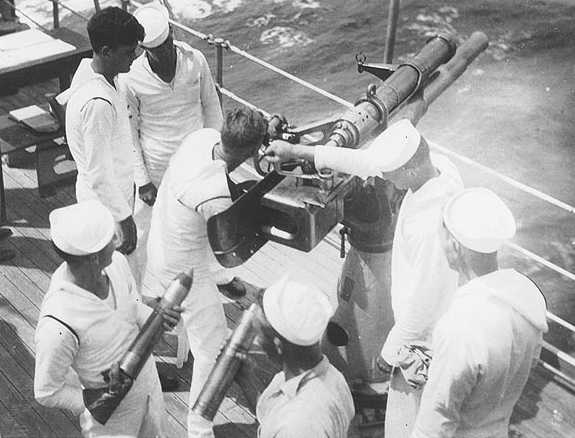
A series of low powered weapons originally designed as boat and landing guns. Mark 4 was a Bethlehem Steel design with a side-swing carrier breech block. Mark 7 was Erhardt-type landing gun built by the American-British Manufacturing Company with a horizontally-sliding breech block. The Mark 9 was a monobloc Bridgman "wet" gun designed for submarines and used a vertically-sliding breech block. This mark was used in a special retractable mount, as can be seen in the photographs below. Mark 9 Mod 0 was a built-up gun while Mod 1 was a monobloc design. Mark 11 a similar design used as a landing gun and built by Bethlehem with a vertically-sliding breech block. Mark 13 was a boat gun built by Driggs with a semi-automatic horizontally-sliding breech block. The Mark 14 was a boat gun adapted by the Poole Engineering and Machine Company during World War I as an AA gun for destroyers. Mark 14 Mod 1 was used aboard patrol craft and had a muzzle blast reducer and a breech counterweight.
Landing guns were mounted on mobile carriages, each gun being provided with a limber for the transport of ammunition. Some guns were given AA mountings during World War I and then used on flush-deck destroyers. Many guns remained in service on these destroyers until the middle of World War II.
About 80 guns were supplied to Britain during World War II, mainly on Lend-Lease ships.
All guns fired fixed ammunition and had similar ballistics, but were of differing construction, the early guns being of the built-up type while the latter were of monobloc construction. The built-up guns consisted of a multi-tube, forged-steel barrel, with one hydraulic recoil cylinder located above the barrel, and one hydropneumatic counter-recoil cylinder located beneath the barrel.
| Designation | 3"/23.5 (7.62 cm) Marks 4 and 14
3"/23 (7.62 cm) Marks 7, 9, 11 and 13 |
|---|---|
| First Ship Class Used On | Many US Ships 1920s - 1930s |
| Date Of Design | about 1900 |
| Date In Service | about 1913 (as AA) |
| Gun Weight | Mark 9 Mod 0 with BM: 749 lbs. (340 kg)
Mark 13 Mod 0 with BM: 531 lbs. (241 kg) Mark 14 Mod 0 with BM: 593 lbs. (269 kg) Mark 14 Mod 1 with BM: 658 lbs. (298 kg) Others: N/A |
| Gun Length oa | Gun: 47.50 in (120.65 cm)
Gun with blast suppressor: about 95 in (241.30 cm) |
| Bore Length | 69 in (1.753 m) |
| Rifling Length | N/A |
| Grooves | N/A |
| Lands | N/A |
| Twist | Mark 4: Uniform RH 1 in 29.89
Mark 9: Uniform RH 1 in 29.89 |
| Chamber Volume | N/A |
| Rate Of Fire | about 8-9 rounds per minute |
| Type | Fixed |
|---|---|
| Weight of Complete Round | 16.5 lbs. (7.5 kg) |
| Projectile Types and Weights | Common Mark 3 Mod 7: 13 lbs. (5.9 kg)
AA Mark 26 Mods 1 and 2: 13 lbs. (5.9 kg) Illum Mark 22 and Mark 28: 13 lbs. (5.9 kg) |
| Bursting Charge | Common Mark 3 Mod 7: 0.28 lbs. (0.13 kg) Black Powder and TNT
AA Mark 26 Mods 1 and 2: 0.74 lbs. (0.34 kg) cast TNT |
| Projectile Length | Common Mark 3 Mod 7: 10.035 in (25.5 cm)
AA Mark 26 Mods 1 and 2 (including nose fuze): 12.13 in (30.8 cm) Illum Mark 22 and Mark 28 (including nose fuze): 13.07 in (33.2 cm) |
| Cartridge Case Type, Size and Empty Weight | Mark 2: Brass, 76.2 x 234 mm, 2.25 lbs. (1.02 kg) |
| Propellant Charge | 1.23 lbs. (0.56 kg) SPD or SPDN 1 |
| Muzzle Velocity | 1,650 fps (503 mps) |
| Working Pressure | 13.0 tons/in2 (2,050 kg/cm2) |
| Approximate Barrel Life | N/A |
| Ammunition stowage per gun | N/A |
- ^Some SPD and SPDN cartridges had flashless pellets added which gave them a "reduced" flash.
- Bourrelet diameter was 2.970 in (7.54 cm).
| Elevation | Range | Angle of Fall | Time of Flight | Striking Velocity | Maximum Ordinate |
|---|---|---|---|---|---|
| 1.15 degrees | 1,000 yards (936 m) | 1.30 degrees | 1.98 seconds | 1,385 fps (422 mps) | 16 ft (4.9 m) |
| 2.62 degrees | 2,000 yards (1,829 m) | 3.03 degrees | 4.38 seconds | 1,157 fps (353 mps) | 81 ft (24.7 m) |
| 9.47 degrees | 5,000 yards (936 m) | 9.98 degrees | 13.68 seconds | 877 fps (267 mps) | 786 ft (240 m) |
| 20.80 degrees | 8,000 yards (7,315 m) | 31.92 degrees | 26.68 seconds | 753 fps (230 mps) | 2,980 ft (908 m) |
| 36.90 degrees | 10,000 yards (9,144 m) | 52.03 degrees | 42.51 seconds | 758 fps (231 mps) | 7,480 ft (2,280 m) |
| 42.50 degrees | 10,150 yards (9,281 m) | 57.68 degrees | 47.33 seconds | 779 fps (237 mps) | 9,235 ft (2,814 m) |
| 48.27 degrees | 10,000 yards (9,144 m) | 62.62 degrees | 51.89 seconds | 803 fps (245 mps) | 11,060 ft (3,371 m) |
| 58.23 degrees | 9,000 yards (8,230 m) | 52.03 degrees | 58.79 seconds | 840 fps (256 mps) | 14,120 ft (4,304 m) |
- ^Values for HC Mark 39 from BuOrd OP 1188 page 7.
| Designation | Single Mounting |
|---|---|
| Weight | Mark 9: 749 lbs. (340 kg)
Mark 13: 531 lbs. (241 kg) Mark 14: 1,510 lbs. (685 kg) |
| Elevation | -15 / +65 or +75 degrees |
| Elevation Rate | Manual operation, only |
| Train | 360 degrees |
| Train Rate | Manual operation, only |
| Gun recoil | Mark 14: 19 in (48 cm) |
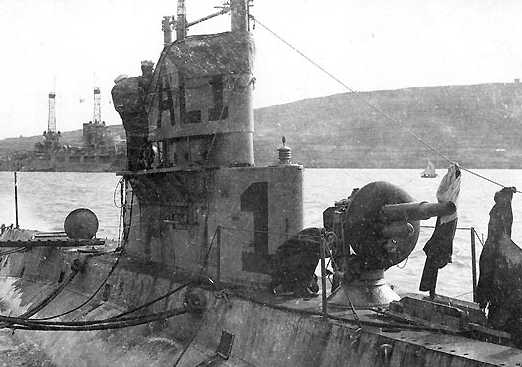
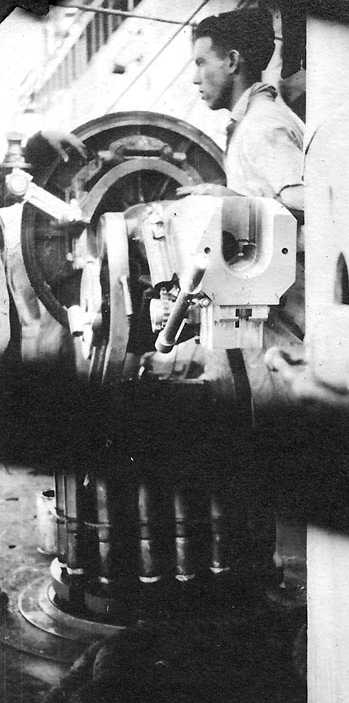
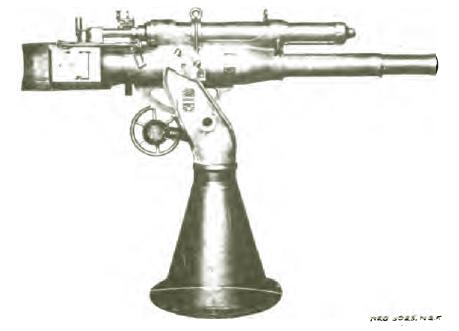
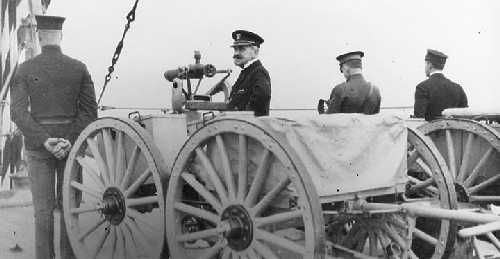
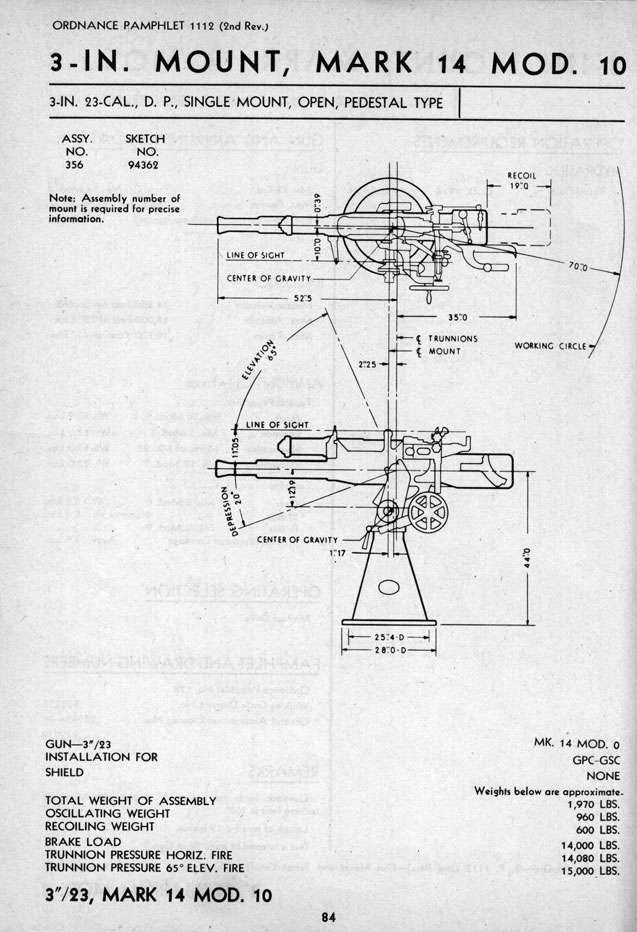
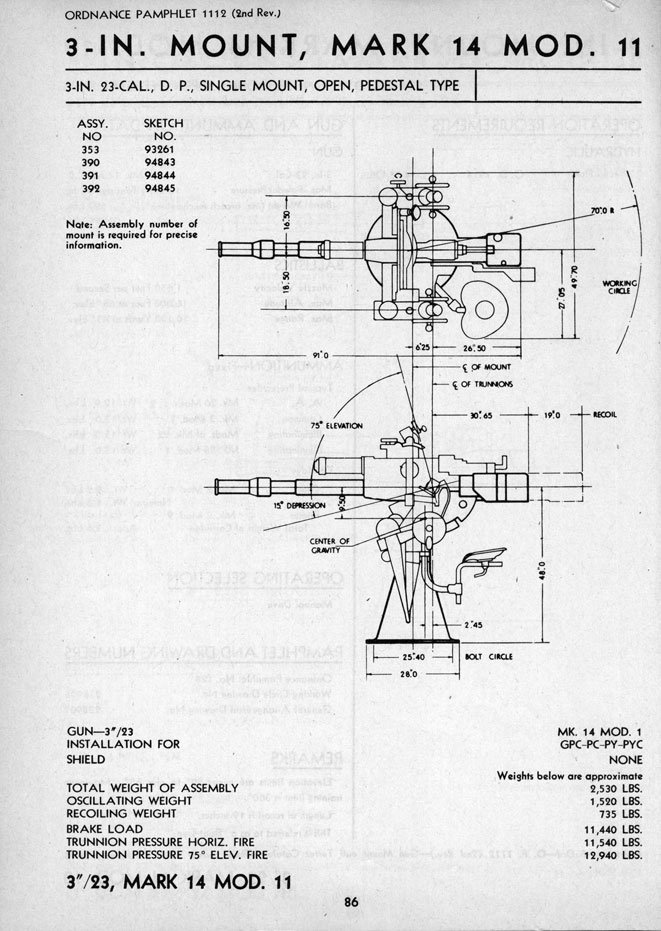
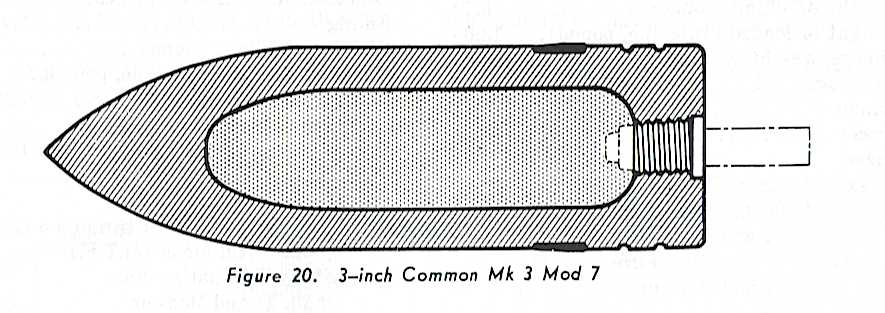
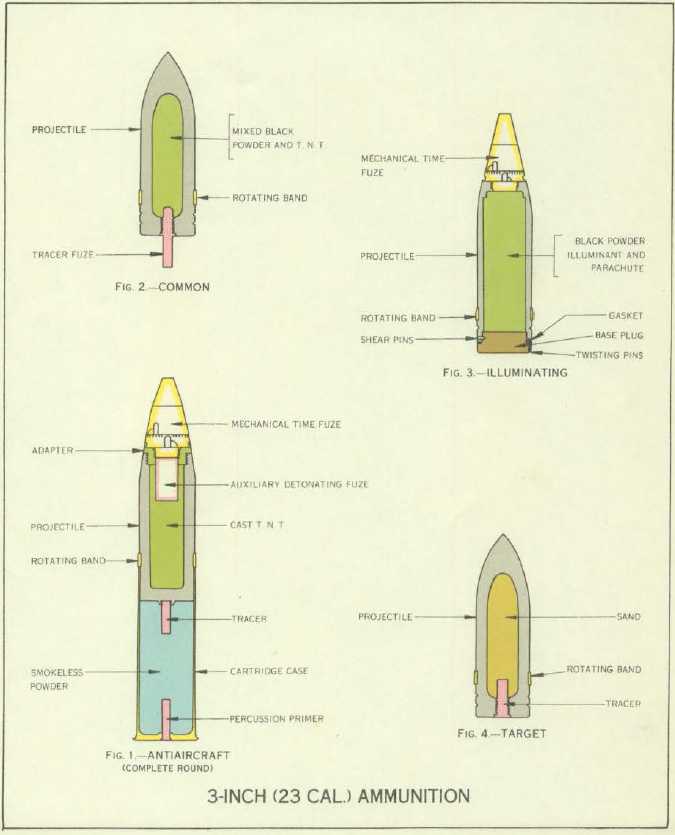
"Naval Weapons of World War Two" by John Campbell
"US Battleships: An Illustrated Design History" and "US Naval Weapons" both by Norman Friedman
"A Treatise on Rifling of Guns" by Carl F. Jeansén
---
"Navy Ordnance Activities: World War 1917-1918" by Department of the Navy, Bureau of Ordnance
"Ammunition: Instructions for the Naval Service: Ordnance Pamphlet No. 4 - May 1943" by Department of the Navy, Bureau of Ordnance
"Abridged Range Tables for U.S. Naval Guns - Ordnance Pamphlet No. 1188, 13 June 1944" by Department of the Navy, Bureau of Ordnance
"U.S. Explosive Ordnance: Ordnance Pamphlet No. 1664 - May 1947" by Department of the Navy, Bureau of Ordnance
Gene Slover's Navy Pages
---
Special help from Leo Fischer
31 May 2008 - Benchmark
14 January 2011 - Added data reference and cutaway sketch
23 October 2021 - Converted to HTML 5 format, added mounting sketches
01 August 2023 - Corrected burster weight and added data to range table
